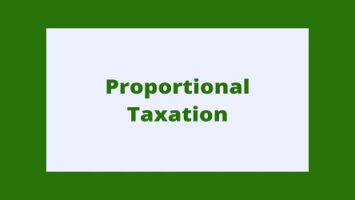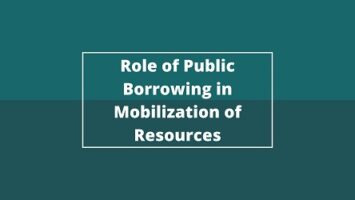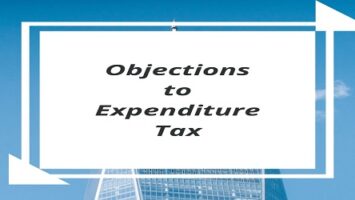Table of Contents
Effect of Public Expenditure on Production:
While analyzing the effects of public expenditure, Dalton very correctly said that just as taxation, other things being equal, should reduce production as little as possible so the public expenditure should increase it as much as possible.” He further stated that a correct view of the effects of public expenditure on production can only be evaluated by enquiring into its effect upon the following factors:
- Effects upon the ability to work, save and invest.
- Effects on willingness to work, save and invest.
- Effects on diversion of economic resources between different uses and localities.
Public expenditure has a positive or negative influence on all these factors. Let us now discuss the nature of the effects of public expenditure on all these factors.
Ability to Work, Save and Invest:
Public expenditure can increase the ability of people to work, save and invest in many ways. Public expenditure on education, medical services, cheap housing facilities, means of transport and communication, etc., will all increase the efficiency of persons to work. Besides, some of these expenditures, like expenditure on free education, unemployment benefit, and free medical facilities are helpful in increasing the purchasing power of the people and especially of low-income groups, and hence helps to protect and promote the efficiency of the people and their ability to work and save. Again, public expenditure for increasing the salaries and wages of the people and supply of goods and articles and other essential Commodities at cheap rates to them will increase their purchasing power, standard of living, and efficiency, and hence their ability to work and save may increase. Likewise, public expenditure incurred for maintaining law and order creates confidence in the minds of the people and hence it encourages them to make an investment in productive activities. As production increases the income of the people also increases and with larger income in the hands of the people their ability to work, save and invest also increases.
On the other hand, if a larger proportion of public expenditure is wasted on social functions, on the production of intoxicants and other articles, which are harmful to health and efficiency, and that too at subsidized rates. It may have an adverse effect on the ability to work, save and invest. Similarly, if the heavy public expenditure is made on the construction of film studies, cinema houses, hotels, and bars, instead of constructing roads, banks, and other means of transport and communication, training schools for engineering, medical and other branches, will prove harmful for production, since such diversions of public expenditure will have adverse effects on the ability to work, save and invest. Hence, public expenditure should be incurred in a way that is most beneficial to the entire community.
Willingness to Work, Save and Invest:
As far as the will to work, save, and invest is concerned, it depends to a great extent upon the character of public expenditure and the policy of the government. For example, old age pension, provident fund benefit, insurance against sickness, and employment at State expense, provide security and safety to a person and, therefore, reduces his willingness to work and save. Obviously, why should a person work hard and save more when he knows that he will be looked after by the government, when he is not able to earn an income, i.e., he finds his future secured? Hence, public expenditure should be regulated in such a way so that it may not adversely affect the incentive to work of the people. Again, a person will not work and save, if he considers that his present saving and investments will not earn an income for him in further, i.e., if he finds that his future is insecure. Therefore his willingness to save and invest will be contracted. If, however, the benefits increase with an increase in work and the volume of savings, the desire to work and save will increase and vice versa The desire to work and save may also increase if the people are confined that their present savings and investment are secure, and will yield dividends to them in future.
It has been argued that social security measures reduce the desire of a person to work save and invest. But practically it does not adversely affect the desire to work save and invest, For example, in England and America social security measures have been provided by the government, and instead of discouraging saving, these measures have been helping in raising them. These measures are socially desirable and the correct view is that the social security measures should be provided to the extent they do not discourage savings and investments. Hence, public expenditure should be incurred in such a way so as to provide social security measures to the maximum extent that the government can afford without directly affecting saving and investment expenditure. Public expenditure should also offer opportunities under which savings and investments are properly rewarded and do not enlarge inequalities.
Diversion of Economic Resources:
Public expenditure diverts resources from private to public use in many ways, for example, the government expenditure on defense, police, civil administration, etc., diverts resources from the private sector to the public sector. Such expenditure is sometimes called economic waste. Every defense program subtracts economic resources from other uses in which they might have made a direct contribution to economic welfare. But it is wrong to assume that this diversion of resources from private use to government use reduces the amount of consumption of goods by the people, and reduces the economic welfare of the people. For example, the expenditure on defense is not unproductive, as it is important for the internal peace and external security of a nation. Internal peace and external security are vitally important to promote economic activities in the country. Hence, public expenditure on defense, police, Justice, etc, is required to create a climate in which better and optimum use of existing and developing resources of the country may become possible. In fact, too much public expenditure on these services may have an adverse effect on production, other things being the same. Hence, such public expenditure should neither be too large nor too small, but enough to maintain internal peace and external security.
The public expenditure on the construction of infrastructure, like roads, railways, irrigation projects, etc., helps in promoting the economic growth and development of the country. The diversion of resources from the private to the public sector for the construction of infrastructure is very essential in a developing country. This type of public expenditure provides incentives for private investment by enlarging the size of markets for various commodities and services. In fact, the presence ad extent of economic overheads in a country indicates the possibilities of economic development of that country. public expenditure in the form of bounties and subsidies is helpful in diverting these sources of people to establish new industries as well as to accelerate the production of existing industries. Similarly, public expenditure on social overheads like education and training, public health, social security schemes, and old age pensions, etc., increases social welfare as well as efficiency and skill of human capital and hence contributes to economic growth and development to a greater extent in developing countries rather than in developed countries. Therefore, the diversion of resources from private to public use for the creation of such social overheads should not be considered unproductive, especially in underdeveloped countries or developing countries. It should now be concluded that public expenditure for the creation of economic and social overheads is vitally important to provide external economies to enterprises and social welfare to human capital and to promote and accelerate the rate of private investments in productive activities and economic growth of the entire community.
Again, Dalton pointed out certain forms of public expenditure which increase productive power and are socially desirable. To the category belong expenditure on
- debt redemption, where most of the money repaid will generally be reinvested.
- productive projects like irrigation, afforestation land reclamation, power, transport development, etc. These projects may yield large returns in the long run, but not in the immediate future, and, therefore, they do not attract private investors.
- expenditure on education, training research, invention, and information.
- public health.
- expenditure in aid of social security schemes, in so far as these promote efficiency and hence increase production.
Dalton was of the view that public expenditure in these forms is socially desirable because it will increase more productive power than it would have increased if the funds required were left in the private hands.
There are some who argue for curtailment of some of these social expenditures, while others believe that their scope and volume should be extended. In each case, it is desirable to balance the effects of a change, in either direction in social expenditure against the effect of a corresponding change in taxation, i.e., the expenditure on each head must be carried on up to that point at which the marginal social benefits from each head is equal to the marginal social cost measured by a reduction in economic or social welfare or output in a Private sector due to transfer of resources to the public sector. However, most modern fiscal theorists consider that increased public expenditure in this form is very desirable from the point of view of present and future returns. “Increased public expenditure in many of these forms is desirable in order to bring about that distribution of the community’s resources between different uses, which will give the best results, balancing without bias the president and future.” Hence it should be concluded here that the diversion of resources plays a vital role in increasing production and the economic, and social welfare of the country and increased public expenditure is vitally important for economic growth and social welfare.
(1) Diversion of economic resources is also important to maintain economic stability- full employment and price stability. The volume of new investment, in any given period, may not always coincide with the volume of new savings, i.e., the investment may not be equal to saving automatically. The lack of this coincidence is one of the causes of instability in the price level, of inflation and deflation, and of unemployment To achieve and maintain such a coincidence, i.e., to achieve and maintain an equilibrium between saving and investment, government intervention is often required, when savings are higher than investment, there would be a recession which would ultimately give way to depression. In such a case government expenditure should remain higher than its revenue. Hence, the government should adopt a policy of a deficit budget. The government’s excess expenditure during the depression should be financed through borrowing from banks and should be diverted toward the public works programme. The expenditure on public works would increase the money incomes in the hands of people and thus, aggregate effective demand may be increased.
To meet this increased demand, investment in the private sector would increase. Eventually, conditions of full employment are created. Investment is equalized to savings, with the help of public expenditure. Contrary to this, when investment expenditure increases than savings, there would be inflation, and the government expenditure should remain at low level than its revenue, i.e., the government should adopt a policy of surplus budget. The budget surpluses should be lent either to public bodies or to selected private enterprises if there is evidence of a shortage of risk capital. The public authority may also become shareholders of these enterprises in lieu of the loans. It should, however, be noted that this aspect is more true for developed countries rather than developing countries. We, however, conclude that the public expenditure may be varied in such a way so that economic stability- full employment and price stability is maintained.
(2) Diversion of economic resources through public expenditure as between different localities will sometimes increase productive power and may reduce regional and territorial inequalities. The government may incur special expenditures in backward areas to make a balanced economic development of the country as a whole. To make rapid industrial development in backward areas, the government may make provisions for special loans, subsidies, and other facilities, for the industries established in these regions. This sort of diversification of resources between localities is generally effected in a federal state through grants-in-aid measures. The grant-in-aid is provided by the Central Government to State Governments, and by the State Governments to Local Governments so that resources are transferred from developed to less developed areas. It improves the productive power of backward regions and removes territorial inequalities.
(3) Diversion of resources in different economic systems- Dalton rightly pointed out that the role of public expenditure for the diversion of economic resources from private use to government use and between localities is important only when the range of economic activities of public authorities in narrow, i.e., in a capitalistic economy. It becomes less and less important as this range widens, i.e., in a socialist economy. In the Soviet Union, for example, public finance merges into the public economy as a whole, where means of production are owned and controlled by the State. The State controls the entire economy. In such an economy, the question of diversion of resources from private use to public use doesn’t arise, but the entire economy is directed by the Central Planning Authority towards certain deliberately chosen ends.
In a mixed economy like India, where both the private and public sectors have to play important roles, public expenditure and its influence on the diversion of resources, ability, and willingness to work, save and invest, is of vital importance for the economic development of the country as a whole.
Dalton concluded on the question of the effects of public expenditure on production and employment as, “whereas taxation, taken alone, may check production, public expenditure, taken alone, should almost certainly increase it.” Obviously, Dalton is very confident that public expenditure will always increase production, if it is carried out so wisely that the check on production, if any, due to taxation, is outweighed by public expenditure.









Comments (No)